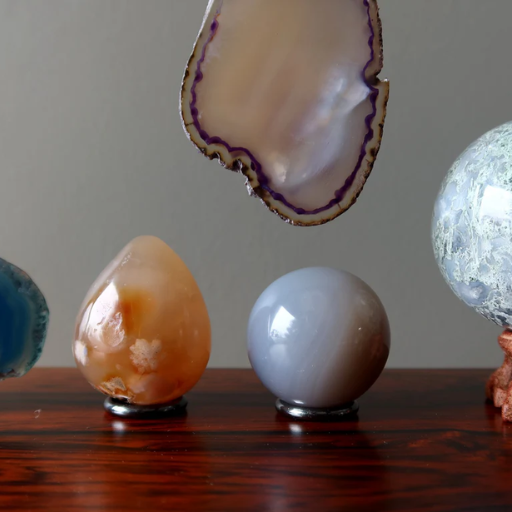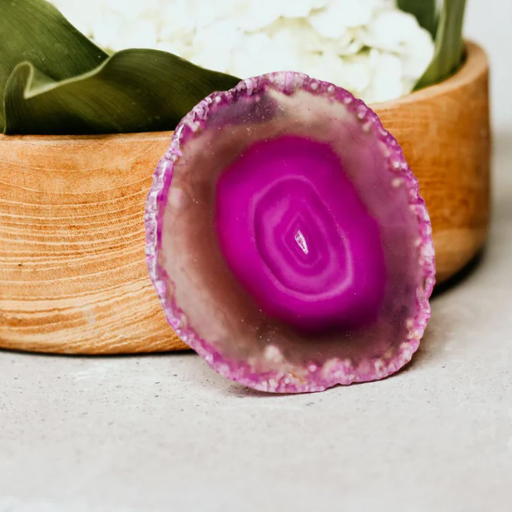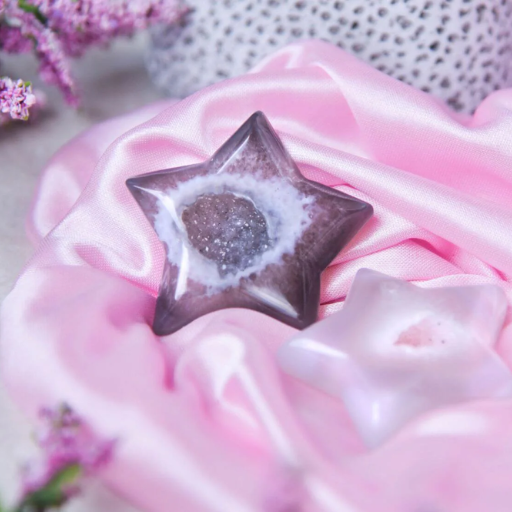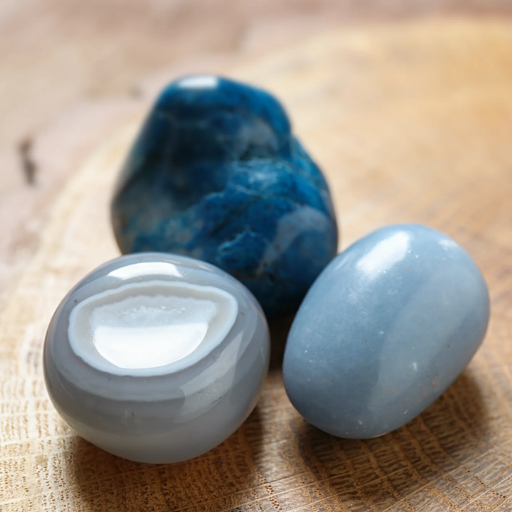Introduction to Agate

One of the varieties of chalcedony is agate, a mineral from the quartz family. It is known for its fine layers and colorful patterns. Agate forms in cavities of volcanic rocks and takes millions of years to form via deposition from silica-rich waters. Because of its colors and banding, agate is valued by jewelers and craft artisans. From a metaphysical point of view, some consider it a protective stone that blends energies and harmonizes them, while others regard it as simply a beautiful agate stone.
What is Agate?
Historically, a prized gemstone, agate has been used for ornamental purposes since time immemorial. A variety of chalcedony, agate is truly blessed with endless combinations of colors and lovely natural markings of all patterns. This semi-precious stone deposits itself in the cavities of a volcanic rock due to the slow precipitation of silica from water, a process that can last for millions of years, creating an endless variety of hues ranging from tones of red and blues to yellows, greens, and purples, often layered with intricate banding and concentric patterns. No two agates are the same, which indeed makes every specimen a rare gift of nature.
Key Agate Facts
- Hardness: 6.5–7 on the Mohs scale
- Formation time: Millions of years
- Primary locations: Brazil, Uruguay, India, USA (Oregon and Montana)
- Uniqueness: No two agates are identical
Historical Significance of Agate
Throughout the centuries, agate has been highly regarded by humanity, not only for its beauty but also for the symbolic and utilitarian applications it possesses. Historians believe agate saw widespread use from ancient times, before the Sumerians and Egyptians could adorn themselves with jewelry, amulets, and intricate sculptures. The ancient Greeks, who saw such properties as protective and healing, also valued agate. During the Renaissance, agate was synonymous with wealth and power and was used in the decorative arts, including bowls and cameos.
The Persian and Islamic traditions associated agate with spiritual powers, saying it wards off evil, brings prosperity, and guarantees protection in battles. Archaeological discoveries of agate articles from across Mesopotamia testify to its importance in trade and cultural exchanges. The stone gained importance particularly for its inscriptions and seals, which denoted authority and safeguarded identity.
Types of Agate: A Comprehensive Overview

Agate is a gemstone with versatility and a vast number of varieties, each possessing a unique pattern, color, and formation. Here are some common agates and their distinguishing features:
The inclusions in moss agate appear like moss or leafy patterns and are believed to foster positivity and balance. Typically, it has a translucent background with green, brown, or blackish inclusions, making it preferred for all kinds of nature-themed jewelry.
Distinguished by delicate shades of light blue and white swirling bands, it is a soothing sight to behold. Blue lace agate is referred to as a communicator’s stone with energies that calm emotions and promote clarity.
Fire agate produces warm colors, a dance of reds, oranges, and gold iridescent feast for the eyes. It is treasured for its sheer beauty yet regarded as having protective and grounding properties.
Botswana Agates are notable for their banding in hues of pink, gray, or peach colored einschluss sets. It is used mainly for emotional support and is considered to encourage creativity and resilience.
Astonishingly vibrant and chaotic in design, this agent shows a combination of red, yellow, and orange hues. It is known for energy amplification and joy and has a calling for those who enjoy uplifting and bright energy.
Favoring tree-like or fern-like inclusions as symbols of growth and abundance, Dendritic Agate is a distinctively patterned stone and is well liked by stone collectors and others with an artistic vision.
The fossil agate contains fossilized remains of prehistoric snails or gastropods. This makes this type bear a deep connection to the earth’s ancient past and is desired by both geologists and spiritualists.
A traditional form of agate, this type has distinctly defined layers contrasting in color. Because of its classic look, it is one of the most widely used agates in jewelry and decorative arts.
Iris agate reflects a wide spectrum of colors underground and above, making it a rare and dazzling variety. When sliced paper-thin, it channels a whole rainbow of hues, an interplay of light reflected and layered.
Agate Properties and Their Meanings
Metaphysical Properties of Agate
This stone is associated with grounding and stability and is hence vital for spiritual and emotional development. It is said to harmonize the mind, body, and spirit by fostering balance and clarity. During meditation, this stone is kept close to boost mental focus and engender an inner calmness.
Recently, Agate has been viewed as a stone of strength. It is said to provide emotional centering and courage so that one can gain strength from their traumatic experiences instead of feeling disgraced. The vibrations of the gemstone can calm anxiety, alleviate feelings of fear or anger, and nurture self-confidence.
| Agate Type | Associated Chakra | Primary Properties |
|---|---|---|
| Blue Lace Agate | Throat Chakra | Clear communication, self-expression |
| Moss Agate | Heart Chakra | Emotional regeneration, nature connection |
| Fire Agate | Root Chakra | Passion, protection, grounding |
| Botswana Agate | Heart Chakra | Emotional healing, comfort |
Healing Properties of Agate
Agate is by and large considered to harmonize and balance energy in the body, mind, and spirit. Its grounding qualities alleviate nervousness and bring about emotional stability, making it an excellent stone for someone seeking serenity in daily life. Additionally, Agate reportedly enhances mental clarity and good concentration, thereby helping one break negative thought patterns and take up a more positive way of thinking.
Physically, Agate is tied with digestive system functions and internal organs like the stomach and intestines; some holistic healers also state that it might strengthen blood vessels and enhance circulation, which in turn promotes the overall vitality of the body.
Cultural and Spiritual Significance of Agate

Agate in Ancient Civilizations
The agate has a long life and history; its beauty and metaphysical attributes were adored by ancient civilizations. The Sumerians, as early as 3000 BCE, were among the first to carve and fashion agate, thinking it possessed divine powers conferring protection and strength. In a rather similar way, sealing stones, amulets, and ornaments were the major uses of agate in Ancient Egypt. Egyptians believed this stone could repel evil spirits and protect one in life and the afterlife.
Cultural Beliefs Surrounding Agate
From prehistoric times to today, agate has remained the favorite of many cultures that have surrounded it with strong cultural associations and spiritual symbolism. Several ancient peoples believed agate to hold protective powers against storms and other natural disasters, and agate was set in Egyptian amulets for protection against disease and to counteract evil spirits. The ancient Romans felt that agate brought balance to courage and strength; the victory of the wearer in battle was manifested.
Market InsightsThe global gemstone marketplace that intertwines crystals like agate was valued at more than $20 billion in 2022 and is projected to continue on an upward trend until 2030, while the wellness industry flourishes further.
Agate in Modern Spiritual Practices
Agate is still a big name in modern spiritual and wellness circles. It is thought to carry unique healing energies, thus becoming an utmost object to anyone involved in crystal healing or meditation. For example, agate is employed by healers for the purpose of clarifying energy flow, offering clarity in thoughts, and heightening confidence in oneself.
- Fire Agate: Ignites passion and courage
- Tree Agate: Evokes inner peace and harmony
- Moss Agate: Promotes growth and abundance
- Blue Lace Agate: Enhances communication and tranquility
Agate in Jewelry and Home Decor

Agate Jewelry: Styles and Significance
Agate jewelry is increasingly popular, marrying timeless elegance with contemporary trends. This versatile gemstone is fashioned into virtually anything-from simple pendants and tiny stud earrings to magnificent statement necklaces and complex bracelets. With its natural banding patterns or coloration, designers would thus foster means of expressing their uniqueness and creativity.
One of the biggest trends in agate jewelry is the application of raw or geode slices, which highlight the gemstone’s raw beauty. This style of unpolished beauty leans toward agate’s appearance as a natural stone, tempting those who appreciate authenticity in their accessories.
Jewelry Market GrowthReports claim that between 2022 and 2031, gemstone jewelry will carry about a CAGR of 4.8%, thereby achieving a milestone of $423.6 billion.
Using Agate in Home Decor
In home decor, agate continues to gain popularity due to its natural elegance and versatility. Its unique bands of color and intricate patterns make it a prized option through which affluence is imparted into any interior space. Homeowners and designers are applying agate to items such as:
- Coasters and trivets
- Wall art and panels
- Countertops and tabletops
- Lighting fixtures
- Accent pieces and bookends
Recent design outlooks show that agate is widely used in backlit wall panels and furniture by virtue of its semi-translucent nature. The demand for agate home decor has been steadily on the rise globally, with recent prominence in regions such as North America and Europe.
Agate Beads and Their Uses
Agate beads have been treasured for eons, their natural beauty, versatility, and utility in various crafts enhancing their applicability in so many different arts. These beads are cut out of slices of the agate stone and rendered into diverse decorative purposes such as jewelry-making, spiritual activities, and home decoration.
| Application | Uses | Benefits |
|---|---|---|
| Jewelry & Fashion | Necklaces, bracelets, earrings, anklets | Fashionable, affordable, versatile designs |
| Therapeutic & Spiritual | Meditation beads, prayer mala, worry stones | Emotional balance, mental clarity, grounding |
| Crafts & Decoration | Beaded curtains, coasters, and wall hangings | Natural beauty, unique patterns |
Contemporary Applications of Agate

Emotional Healing with Agate
Agate in the history of gemstones has sustained a reputation for emotional healing, standing as an offering of calm and stability to those who look to the stone in their lives. Said to be a grounding stone, agate is thought to somehow restore an ailing person’s emotional realm with moments of mental clarity in periods laced with stress or confusion.
Lately, some debates and research have shed light on how the claims fit in with mindfulness. Agate finds application in meditation and mindfulness, where it is employed either as a focal point or for economic grounds due to its intricate patterns and grounding energy. People also use agate in its many forms, such as worry stones or crystal grids, to help promote a sense of safety and calm inside the being.
Crystal Healing Practices Involving Agate
Being reputed for its grounding traits, agate has now successfully woven itself into the tapestry of modern crystal healing. Search trends on Google show a marked increase in terms such as “agate for mental clarity” and “how to use agate for healing,” indicating a growing trend toward personalized wellness practices.
- Placed on the third eye or in the palm during meditation
- Combined with aromatherapy (lavender, frankincense)
- Used in agate-infused water for balance
- Incorporated into crystal grids for emotional stability
Why Agate Continues to Captivate People Today
Agate’s very essence is an amalgamation of geology and culture; in the present day, there is an increased interest in holistic health methods. Over the past five years, global Google Trends data shows an upward trend in searches for the term “agate crystals,” representing sustained interest in their value for aesthetic and metaphysical purposes.
Market ProjectionThe global market for crystals, including agates expected to reach a billion-dollar industry by 2025, driven by mindful living and new-age healing practices.
Frequently Asked Questions (FAQs)
Reference Sources
- Fairfax County Park Authority: An Agate & The Grange – Tells of the ceremonial use of agate as a symbol of fidelity.
- State of Tennessee: State Symbols-About Tennessee – Provides information about agate as Tennessee’s state rock, hinting at its geological and cultural significance.
- Minnesota Secretary of State: State Symbols-Minnesota – Features the Lake Superior Agate as Minnesota’s state gemstone and emphasizes its importance and symbolism.







